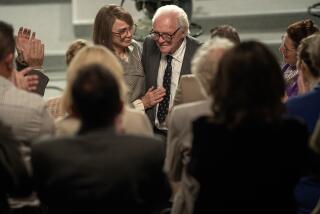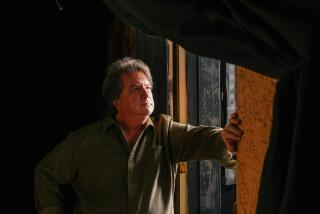Review: Andrew Scott triumphs in the streaming one-man play ‘Three Kings’
One day in July I found myself in an hourlong internet queue to purchase a ticket to a play I knew nothing about by a writer whose name meant little to me. It was the marquee billing of Andrew Scott that had so many of us hovering over our laptops, credit card in hand.
The title of the work, “Three Kings,” had me wondering if there might a biblical theme to this new drama by Stephen Beresford. Public information was sketchy. All I knew for sure was that the production, part of the “Old Vic: In Camera” initiative, was to be streamed live from the storied London venue to computer screens around the world.
I had seen an earlier “In Camera” offering, Duncan Macmillan’s play “Lungs,” which reunited the stars of “The Crown,” Claire Foy and Matt Smith, in a presentation that was stripped to the fundamentals: actors, text and the necessary lighting. This was high-caliber pandemic producing, designed to keep a theater afloat through a crisis that not even the more established companies are certain they can survive.
That the star was Scott — whose fame as Moriarty in the BBC series “Sherlock” seemed to reach new sensual heights after his Season 2 appearance as the “hot priest” in Phoebe Waller-Bridge’s cult-hit, “Fleabag,” — was all anyone needed to know. You could almost hear the global groan as the Old Vic announced that illness, not COVID-related, was forcing the postponement of “Three Kings.” “Minor surgery” led to further delays and no doubt worldwide prayers for the recovery of the show’s star.
At long last, dates were confirmed, and on Saturday of Labor Day weekend (when media were booked for the end of the three-day run), I finally had my encounter with Scott in “Three Kings.” I was mostly hoping that the show would go off without a hitch, but I’m happy to report that it was among the finest performances I’ve seen since COVID closed the theaters. I admired Scott’s faun-like Hamlet in the Almeida Theatre production that transferred to the West End and was reminded of the sensitive intelligence of his melancholy prince by the subtle internal shifts he brought to bear in Beresford’s solo drama.
In this moment of Zoom theater, the monologue play is a natural fit. Ideal for physical distancing, the genre requires an actor to find drama in the incantation of character. But memorable work, in or out of quarantine, is a rare attainment.
Solo turns invite a particular kind of virtuosity: Performers, even when losing themselves in a role, often seem to be showing what they can do — the equivalent of riding a bike no-handed in front of slack-jawed parents.
But Scott’s magnificently calibrated performance, directed by Old Vic artistic director Matthew Warchus as though the play were a character score, didn’t merely sketch a theatrical figure worthy of a solo play. His portrayal drew out the play’s literary color, delivered the ironic shadings with humorous understatement and extended the work’s psychological meaning beyond a single life.
“We no longer felt it reasonable or responsible to keep our furloughed staff waiting in limbo any longer,” says the company, which is laying off 91.
The subject of “Three Kings” is the relationship of a son to his absent father. Patrick recounts that he first met his dad when he was 8 years old. It was an inauspicious encounter. His blowhard father, considered a “proper character” by chums but a conman and malignant narcissist by those he inevitably cheats and betrays, gives his boy a lesson on pub etiquette. As a filial bonus, he demonstrates a confidence trick involving three coins.
Patrick, who lives in Dublin with his mother and sister, is enthralled by the masculine attention. He hopes this is the start of a new chapter in his life, but his father agrees to see his son again only if he can figure out the secret of his baffling coin game.
Patrick fails, and his father keeps his cruel word. Their next contact eight years later doesn’t go any better. Patrick’s father, who flitters from Switzerland to Spain, leaving a murky trail of myth and misery behind him, has no sense of paternal obligation. He lives to indulge and defend his passing fancy.
“You can’t love what disappoints you. Can you?” These words are spoken by Patrick’s father on his deathbed, but the question also haunts Patrick, who is beginning to understand the way an absence can be an inescapable presence — perhaps even a fate.
With his wiry build and handsome lived-in face, Scott moved seamlessly between Patrick’s youthful consciousness and the dawning self-awareness of a man who has become his father’s son. Even as age weathered and wearied Patrick into a morning brandy drinker, Scott’s portrayal maintained an 8-year-old’s forlorn innocence.
Scott was just as adept at animating an array of supporting and incidental characters. He brought Patrick’s unstable mother to life with an offhand remark of piqued vanity. The tatty grandiosity of Patrick’s father was etched with as much admiration as condemnation. (Scott can arch an eyebrow with his voice alone.) And, in a stirring encounter with the half-brother Patrick seeks out, Scott provided a mirror for souls to examine the different contours of their similar wounds.
Beresford’s small yet well-measured tale is elevated by the actor’s art. The result is such a satisfying collaborative fusion that it would be a shame if Scott weren’t already planning a return engagement of “Three Kings.”
More to Read
The biggest entertainment stories
Get our big stories about Hollywood, film, television, music, arts, culture and more right in your inbox as soon as they publish.
You may occasionally receive promotional content from the Los Angeles Times.








